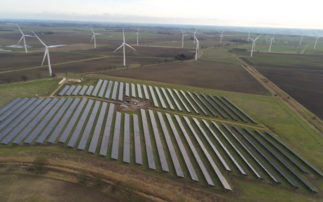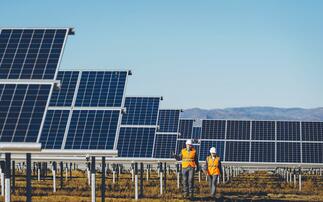Chinese company is not only first renewable energy company to sponsor the World Cup, but also its first carbon-neutral sponsor
Eagle-eyed World Cup viewers may have noticed the 1,500 solar panels encircling the roof of the iconic Maracanã stadium in Rio de Janeiro. The 1MW system is the most eye-catching element of Yingli Solar's presence at the event, after it became the first renewable energy company to sponsor the World Cup.
Yingli has already sponsored US MLS soccer, German football club Bayern Munchen and the New York Jets American football team. But as Judy Tzeng Lee, vice president of global marketing at Yingli, explains, the global exposure at the World Cup enables Yingli to promote the solar sector to a new audience in emerging markets, and highlight its commitment to sustainability by becoming the tournament's first ever carbon-neutral sponsor.
BusinessGreen: Yingli is the first renewable energy company to sponsor the World Cup. Does this show green energy is becoming mainstream?
Lee: One of the chief goals of our 2014 FIFA World Cup sponsorship is to bring solar energy into the mainstream. Football is without question the world's most popular sport with the broadest population base of fans throughout the world, which allows us to make a bigger impact on consumers' awareness of solar energy than any other sponsorship could.
In 2010, we believed the global solar industry was at a tipping point and that establishing Yingli as a leading global brand and world-class company in the minds of consumers is important to our long-term success. The global solar industry was shifting from a B2B market towards one that is geared more towards consumers, so it was time to adopt marketing tactics that drive our brand name recognition and position Yingli as a world-class company.
Now we believe solar is well on its way to becoming mainstream. Consumers are already beginning to recognise the wide range in product quality that exists in our industry - and as they become more educated, brand names will matter.
Through the FIFA World Cup, we can promote solar energy - and Yingli - so people understand that solar PV is more affordable, accessible, and widely available than ever before. We believe that green energy is certainly on its way to becoming mainstream, but there is broad variance in its adoption across different regions, so it is important for companies such as Yingli to actively drive solar energy awareness and adoption among consumers.
Beyond the system at the Maracanã stadium, is Yingli supplying solar panels to other sites or infrastructure in Brazil?
Besides Maracanã, Yingli has supplied more than 1MW of solar panels to large-scale solar projects at Arena Pernambuco, the site of five 2014 FIFA World Cup matches. The system installed at Arena Pernambuco will meet 30 per cent of the stadium's electricity needs and while it is not in use, the energy will be directed to the community through the local utility grid, thanks to Brazil's net metering policies.
As Brazil's leading solar PV supplier, we have also supplied a broad range of projects across Brazil, but so far have seen the most success in the distributed generation segment. We expect to see more activity on the utility side in 2015, thanks to upcoming federal energy auctions which initial reports suggest will be much more supportive of solar than past auctions have been.
One Brazilian project of which we are particularly proud is a 4.6kW system at the Lidia dos Santos Community Center, located in Rio de Janeiro's Morro dos Macacos favela. It was installed by local youths living in the favela after completing an intensive training programme conducted by Greenpeace Brazil, and it shows how going solar can drive positive social change by creating opportunities for professional development and employment in a burgeoning industry.
What other activities does Yingli have planned during the tournament?
On-site in Brazil, we have Yingli Solar charging stations in FIFA World Cup stadiums; co-branded FIFA information towers in all FIFA World Cup stadiums that are powered by off-grid solar PV kits; and a customer hospitality programme for the finals and semi-final matches, which includes a day of service dedicated to dune preservation on the Rio de Janeiro coastline. In addition, all carbon emissions arising from sponsorship-related activities in Brazil will be offset by our solar energy projects installed in FIFA World Cup stadiums and through investments in carbon-emission reductions certificates generated by a local Brazilian project.
As the first Chinese company to sponsor the FIFA World Cup, we are proud to bring our heritage and culture to the global stage. Our perimeter boards feature Chinese characters, and are shown in every FIFA World Cup stadium and broadcast. We will showcase "中国英利", which means "China Yingli" and "Yingli Solar" as well as "光伏入户" which means "solar into every home." And in everything we do, we try to be responsible in every decision we make - this is why we plan to become the very first carbon-neutral sponsor in FIFA World Cup history.
Are there particular regions or demographics Yingli is targeting - and are you looking at similar tie-ins with sports events or teams?
Our FIFA World Cup sponsorship is a global initiative for Yingli, and we believe it is one of the best marketing platforms in the world. Football is an incredibly popular sport in China as well as in the European countries where we operate, and it's also important in emerging solar markets where we're expanding our presence, such as Japan, Africa, and Latin America.
Brand name recognition is a tremendous advantage everywhere we operate, but especially in emerging markets where emerging solar energy companies have not yet established strong relationships with solar PV suppliers. We are constantly evaluating different marketing and sponsorship opportunities, but we currently do not have any new sponsorships on the horizon.
What is the rationale behind the sponsorship, given Yingli's customers are primarily installers rather than standard consumers and the company has posted consistent losses?
It's also important to recognise that in emerging markets, especially markets such as Latin America where football is incredibly popular, sponsoring the FIFA World Cup and offering customer hospitality programmes helps Yingli connect with its potential and existing customers, including installers, and not to only consumers. If the significant increase in sales enquiries we have experienced thus far during the FIFA World Cup is any indication, emerging solar energy markets worldwide stand to benefit as they're eager for world-class companies such as Yingli to provide affordable, accessible solar solutions, but have limited exposure to leading companies like ours.
Can we expect solar costs to continue to fall, and what will that do to the market over the coming years?
First we have to understand which "cost" one is referring to. Simply saying "the cost of solar" can be very vague. A solar project consists of many things, including inverters, cost of installation, racking systems and many more. Solar panels (which Yingli manufactures) is only one part of the solar project.
Let's say if you were making a pizza, perhaps Yingli's product is just the dough. So the cost for us to manufacture our solar panels is very transparent as we are a US-listed public company. We divide it into manufacturing cost (non-silicon cost) and silicon cost. We have one of the lowest costs in the world for the manufacturing processing cost and will continue to look for ways to drive this cost down.
Our mission is to provide affordable green energy for all. Therefore, at Yingli, our goal is to drive down the cost of solar for everyone around the world. At Yingli, we are innovating to develop and improve PV technologies so that solar energy can continue to deliver meaningful economic savings, as well as public health and environmental benefits.
What can we expect from Yingli over 2014 and 2015?
For customers, we will continue to pursue manufacturing improvements and technical innovations that can enhance our operational efficiencies and product offerings. Our efforts range from maximising our capacity utilisation rates to creating PV kits which feature Yingli Solar modules along with BoS components, in addition to driving cell efficiency improvements.
For our communities, we will continue to look for ways to utilise our products to give back to our community, such as our employees, our society, and the environment around us. We are deeply involved in many corporate social responsibility programmes that aim to help serve and protect the planet we inhabit.









